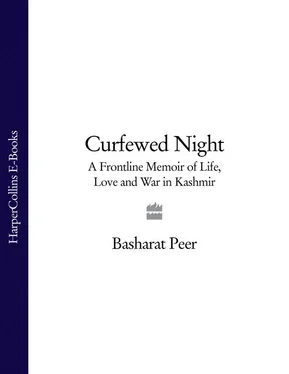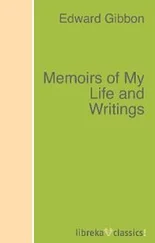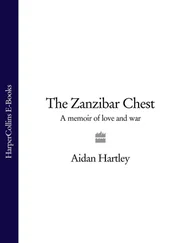In the late-196os, Grandfather was teaching in a high school in a neighboring village when he noticed an eighth-grade student. Ahmad was the brightest in the school and also one of the poorest—an orphan being raised by his cousins, who wore ill-fitting hand-me-downs and wore torn bathroom slippers instead of shoes. Grandfather felt that with a good education and family support, Ahmad could go far, and he would often mention him to my grandmother. “Go, talk to his family. We can support him,” she told her young husband. And thus my grandfather became a mentor and a de facto father to young Ahmad.
Ahmad taught at a private school while in college; after graduation he got a high school teacher’s job, like my grandfather. Then some of my grandfather’s friends suggested that he should marry Ahmad to his eldest daughter, Hameeda, who also had graduated from college and become a teacher. Ahmad and Hameeda had known each other since school. They agreed to the proposal and were married. A year later, Ahmad qualified for the competitive selection test for the Kashmir civil service and was appointed a magistrate. And then I was born, their first son, in the winter of 1977. Father’s postings in various towns across Kashmir kept him away most of the time.
On most Saturday evenings throughout my childhood in the mid-eighties, a blue Willys jeep would drive to my village in southern Kashmir. It would follow the black ribbonlike road dividing vast expanses of paddy and mustard fields in a small valley guarded by the mighty Himalayas. Two- and three-floor mud-and-brick houses with tin and thatch roofs faced the road. Most were naked brick, and though a few were brightly painted, dust and time had colored their rough timber windows and doors a deep brown. A ground-level room in every third house had been converted into a shop. Villagers sat in the wooden storefronts gossiping, talking politics and cricket, waving at the jeep. A not-so-tall man in his early thirties, almost always wearing a suit, a matching tie, and brown Bata shoes, would raise his right hand in greeting. He had deep brown eyes, a straight nose, plump pink cheeks, and the beginnings of a belly. The Willys would slowly come to a halt in a village square, not far from a blue-and-green milestone that gave the name of our village: SEER, O KILOMETERS.
Father would step out of the jeep and walk toward us, past a grocery store and a pharmacy. People at the storefronts would say, “Peer Sahib is here.” They would rise from their seats, and a chorus of greetings and hands would welcome him home. The first hand Father shook was that of my grandfather, who would blush with pride. I would run toward Father and grab the piles of books, newspapers, and office files he carried. He would sit in his usual corner in our drawing room, facing the road. I would run to the baker next to the pharmacy and get fresh bread. Mother would bring a boiling samovar of noon chai , the salty pinkish Kashmiri tea.
Father would tell me stories from the papers and encourage me to read the newsmagazines, answering my questions over more cups of tea. In one of those sessions, he told me that he wanted me to join the Indian civil service when I grew up. It had a professional exam tougher than that of the provincial Kashmir civil service, which led to higher positions in the bureaucracy than my father’s. “He didn’t have the resources and time that you will have,” Mother said. Father began preparing me, bringing me children’s books about politics, history, and English literature, books such as Tales from Charles and Mary Lamb’s Shakespeare or One Hundred Great Lives . We would read them together every time Father came home. One of his heroes was Abraham Lincoln, and he talked a lot about how Lincoln read by candlelight and, through his hard work and honesty, became the president of America. In a few years we had made the transition to spending Sundays reading Othello, Hamlet , and The Merchant of Venice .
Despite the apparent tranquillity of our lives, I was beginning to get a vague sense of the troubled politics of Kashmir. In 1986 India and Pakistan were playing each other in the finals of a cricket tournament in the United Arab Emirates. On the day of the match, the atmosphere on the bus I took home from school was charged. Men, women, and children—some standing in the aisle and others on seats—huddled around radios, straining to catch every word of the commentary. Pakistan was chasing a difficult score set by India, and the number of balls they could play was running out fast. I stood in a corner behind the driver’s seat and watched the driver push harder on the accelerator and continually take a hand off the wheel to raise the volume of the transistor on the dashboard. Everybody wanted to get home for the final phase of the match. Every time Javed Miandad, the Pakistani batsman, missed a ball, the bus erupted in a chorus of swearing. Every time he hit the ball and scored a run, we let out loud exclamations of joy.
The bus stopped in the tiny market near my house. Excited crowds had gathered at the pharmacy and the butcher’s shop. The match was about to end. Abu, the old butcher, was biting his lips. I rushed to drop my school bag at home. In our drawing room, my grandfather, my aunts, and my mother sat in a circle around the radio. Grandmother faced Mecca on a prayer mat, seeking divine help for the Pakistani team. I dashed outside and heard the radio commentator say, “Pakistan needs three runs on one ball to win this match. Chetan Sharma will be bowling to Javed Miandad from the pavilion end of the stadium.” The crowd was silent, tense. Abu’s hands fell at his sides. “There is no chance. Just no chance!” He seized his radio and smashed it on the road. We watched the pieces scatter, and then we gathered around the pharmacist’s radio. Chetan Sharma, the Indian bowler, was about to bowl the last deciding ball of the match to the Pakistani batsman, Miandad. The commentator told us that Miandad was scanning the field, deciding where to hit the ball when it reached him. Then he bowed west toward Mecca in prayer. He rose from the ground and faced Sharma, who was running toward the wickets. Sharma was close to the wickets, and a tense Miandad faced him. The stadium was silent. Sharma threw the ball. It was a full toss. Miandad swung his bat. Almost everyone stepped back and waited. Silence. Amin pushed his shirtsleeves up to the elbows; Abu continued biting his lips; and I boxed my left palm with my right fist. The commentator shouted, “It is a six! Pakistan has won the match. They have scored three more runs than required.” People hugged, jumped around, and shouted over the din of the celebratory firecrackers.
Kashmir was the largest of the approximately five hundred princely states under British sovereignty as of 1947. Kashmir was predominantly Muslim but ruled by a Hindu maharaja, Hari Singh; the popular leader, Sheikh Mohammed Abdullah, preferred India to Pakistan and an independent Kashmir to both. When India was violently partitioned in 1947, both Singh and Sheikh Abdullah sought time before deciding Kashmir’s fate. In October 1947, however, tribesmen from the northwest frontier province of Pakistan, supported by the Pakistani army, invaded Kashmir, forcing their hand. Singh decided to join India, and Sheikh Abdullah, who was a friend of the new Indian prime minister, Nehru, supported him. In January 1949 the fighting stopped after the UN intervened. The UN endorsed a plebiscite for Kashmiris to determine which country they wanted to belong to, and created a cease-fire line. The line still divides Kashmir into Pakistan-controlled and India-controlled parts, and it is now known as the Line of Control (LoC).
The agreement of accession that Hari Singh signed with India in October 1947 gave Kashmir great autonomy. India controlled only defense, foreign affairs, and telecommunications. Kashmir had its own constitution and flag; the heads of its local government were called the president and the prime minister. Gradually, this autonomy disappeared. In 1953 India jailed Sheikh Abdullah, who was then Kashmir’s prime minister, after he implemented a radical land reform and gave a speech suggesting the possibility of an independent Kashmir. In the following decades, India installed puppet rulers, eroded the legal status of Kashmiri autonomy, and ignored the democratic rights of the Kashmiris. Sheikh Abdullah remained in jail for around seventeen years; when he was released, he signed a compromise with the Indian government in which he gave up the demand for the plebiscite that the UN had recommended. He spent the remaining years of his life in power, and the period (also of my childhood) was relatively peaceful. In 1987, five years after his death, the Indian government rigged state elections, arresting opposition candidates and terrorizing their supporters.
Читать дальше












